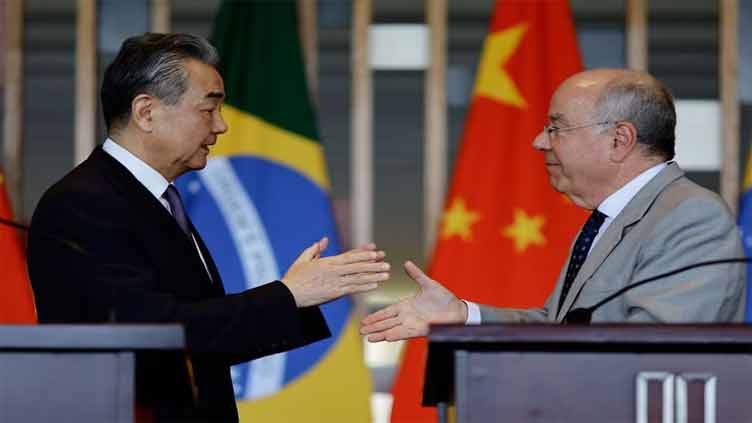Brazil backs Beijing's 'One China policy,' foreign minister Wang Yi says

World
China is Brazil's largest export market, mainly for soy and iron ore
BRASILIA (Reuters) - Chinese Foreign Minister Wang Yi welcomed Brazil's recent support for Beijing's "One China policy" that states Taiwan is an inseparable part of China, in a sign of stronger bilateral ties with South America's largest country.
At the end of a two-day visit to Brazil, Wang made a stop in the northeastern Brazilian city of Fortaleza to meet Brazil's President Luiz Inacio Lula da Silva at an air force base before departing to Jamaica by the late afternoon.
There were no details of their meeting.
In Brasilia earlier, Wang said their two countries, both members of the BRICS group of leading emerging economies, must work together to build a multi-polar world based on peace and security.
Brazil's Foreign Minister Mauro Vieira said he and Wang discussed the conflicts in Ukraine and Gaza and how they can be resolved, with China's top diplomat saying the two trade partners need to build closer levels of confidence.
China-Brazil relations were ruffled during the far-right government of former President Jair Bolsonaro, and have improved under Lula, a popular leftist leader in his third term.
/cloudfront-us-east-2.images.arcpublishing.com/reuters/SYNM2SP24NO4RA52BRZ4RBAY44.jpg)
Wang and Vieira signed a visa agreement between the two nations extending their validity from five to 10 years, aimed at spurring business travel and tourism.
Wang stopped in Fortaleza en route to Jamaica, the last stop of his tour that began in African nations.
Lula was traveling in northeast Brazil, his main political bastion, eyeing municipal elections this year.
Brazil's position on Taiwan was established in April in a foreign ministry statement that expressed Brazil's "firm support to the One China Principle" and said China was "the sole legitimate government of the whole of China, and Taiwan being an inseparable part of the Chinese territory."
China is Brazil's largest export market, mainly for soy and iron ore. Chinese companies are planning to increase their investments in Brazil, in power transmission, oil and electric vehicles, businessmen said at a Brazil-China meeting last week in Shenzhen with major Chinese corporations.
Marcos Caramuru, a China watcher and former Brazilian ambassador in Beijing, said he is seeing growing interest of Chinese companies in investments in electric vehicles and in infrastructure in Brazil, as well as new investments in areas where China has been investing for a while, such as the electricity sector and e-commerce.
"Lula as president has helped to increase the level of mutual confidence in Brazil-China relations," Caramuru said.


